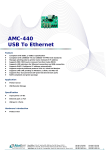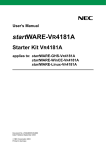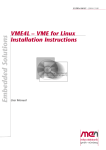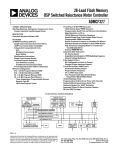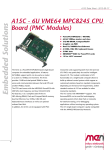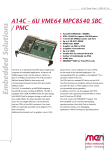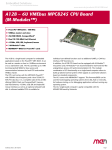Download 21APPN012 E1 Application Note - University of Manchester
Transcript
Embedded Solutions 21APPN012 E1 – 2008-04-03 MDIS™ Examples under Linux MDIS4™/2004 System Package for Linux Edition E1 Comments First edition Technical Content T. Schnürer Date of Issue 2008-04-03 Application Note ® Contents Contents 1 Introduction. . . . . . . . . . . . . . . . . . . . . . . . . . . . . . . . . . . . . . . . . . . . . . . . . . . . 3 2 Example MDIS Projects . . . . . . . . . . . . . . . . . . . . . . . . . . . . . . . . . . . . . . . . . . 4 2.1 EM1 CAN . . . . . . . . . . . . . . . . . . . . . . . . . . . . . . . . . . . . . . . . . . . . . . . 4 2.1.1 Creating the Project in MDIS Wizard . . . . . . . . . . . . . . . . . . . 4 2.1.2 Building the Project and Installing Driver Files . . . . . . . . . . . 7 2.1.3 Running the MSCAN Examples . . . . . . . . . . . . . . . . . . . . . . 11 2.1.4 Troubleshooting . . . . . . . . . . . . . . . . . . . . . . . . . . . . . . . . . . 13 2.2 Watchdog/Board Controller on F14 . . . . . . . . . . . . . . . . . . . . . . . . . . 15 2.2.1 Prerequisites . . . . . . . . . . . . . . . . . . . . . . . . . . . . . . . . . . . . . 15 2.2.2 Copying the Files . . . . . . . . . . . . . . . . . . . . . . . . . . . . . . . . . 16 2.2.3 Building the Driver Files. . . . . . . . . . . . . . . . . . . . . . . . . . . . 16 2.2.4 Installing the Driver Files . . . . . . . . . . . . . . . . . . . . . . . . . . . 17 2.2.5 Accessing the Driver . . . . . . . . . . . . . . . . . . . . . . . . . . . . . . . 18 2.2.6 Testing the Watchdog Functionality . . . . . . . . . . . . . . . . . . . 20 2.3 PP4 MVB Slave Board on F207 Carrier and F14 CPU. . . . . . . . . . . . 22 2.3.1 Used Carrier Hardware . . . . . . . . . . . . . . . . . . . . . . . . . . . . . 22 2.3.2 Descriptor File system.dsc . . . . . . . . . . . . . . . . . . . . . . . . . . 23 MEN Mikro Elektronik GmbH 21APPN012 E1 – 2008-04-03 2 Introduction 1 Introduction The various possibilities of combining MEN hardware and software products sometimes makes it difficult to decide which packages are needed for a certain system or how the drivers can be built. Although the MDIS Wizard is taking a lot of difficult configuration tasks away from customers, there are some driver- and boardrelated configurations which currently cannot be configured in the MDIS Wizard. This application note tries to show some examples of regular MDIS Wizard configured projects and also projects where manually predefined MDIS descriptor files and Makefiles are necessary. It shall help customers – together with the MDIS under Linux user manual – to get their MDIS projects up and running in short time. You can find all available downloads around the MDIS4/2004 system package for Linux, including project examples discussed in this document, on MEN’s website. (Article no. 13M000-13.) MEN Mikro Elektronik GmbH 21APPN012 E1 – 2008-04-03 3 Example MDIS Projects 2 Example MDIS Projects In this chapter the demo projects are introduced and built. If driver packages other than the MDIS system package are needed this is mentioned under headline 'Prerequisites'. 2.1 EM1 CAN This project demonstrates how to access the MPC5200 on-chip CAN controllers. The driver is the MSCAN driver that supports the 16Z029_CAN FPGA IP core. The driver is used in two flavors within MDIS: as a driver for the on-chip CAN controllers and also as a driver for the 16Z029_CAN FPGA IP core that can be built into the EM1’s on-board FPGA. 2.1.1 Creating the Project in MDIS Wizard ; Start the MDIS Wizard with command /opt/menlinux/BIN/mdiswiz ; Select an EM1 CPU board: ; Add the CAN driver to the two on-chip CAN ports: MEN Mikro Elektronik GmbH 21APPN012 E1 – 2008-04-03 4 Example MDIS Projects ; Select the MSCAN_5200 driver component: ; Do this for both CAN controllers so the configuration looks as shown below: MEN Mikro Elektronik GmbH 21APPN012 E1 – 2008-04-03 5 Example MDIS Projects ; The Software Modules settings should look like this: When the project is saved, the Makefile and the system description file system.dsc are generated and stored. MEN Mikro Elektronik GmbH 21APPN012 E1 – 2008-04-03 6 Example MDIS Projects 2.1.2 Building the Project and Installing Driver Files When the project was created, the build can be started either from within MDIS Wizard or at the command line, which was used for this example. Mind that in the following build log examples many lines are omitted so the log does not fill numerous pages in this document. When lines of output are skipped this is marked through "[...]". The build logs are also available in the example project's ZIP archive. (See note on page 3 for hints on download of the example projects.) ; First, "source" the ELINOS.sh file created by ELinOS to set environment variables by calling it with a leading ’.’ as in the example below: tslinux2:/home/tschnuer/work/LINUX/ELINOS_PROJECTS/ELINOS_41_S1317/em01img # . ELINOS.sh STARTING ELINOS SESSION ======================= Setting up CDK ppc_60x for glibc-2.3.4 $ELINOS_PREFIX $ELINOS_BOARD $ELINOS_BIN_PREFIX $ELINOS_BOOT_STRAT $ELINOS_KERNELPATH $ELINOS_PROJECT $ELINOS_DOSNAME $CC $CXX $AS $GDB = = = = = = = = = = = /opt/elinos-4.1 menem1 ppc_60x uboot_multi men5200/linux-2.6.15 /home/tschnuer/work/LINUX/ELINOS_PROJECTS/ELINOS_41_S1317/em01img em01img ppc_60x-gcc ppc_60x-g++ ppc_60x-as ppc_60x-gdb ; Then, change into subdirectory /src/mdis and execute make: tslinux2:/home/tschnuer/work/LINUX/ELINOS_PROJECTS/ELINOS_41_S1317/em01img # cd src/mdis/ tslinux2:/home/tschnuer/work/LINUX/ELINOS_PROJECTS/ELINOS_41_S1317/em01img/src/mdis # make Getting Compiler/Linker settings from Linux Kernel Makefile Cleaning .kernelsubdirs ++++++++ Preparing debug version of module men_mdis_kernel +++++++++++ Directory OBJ/dbg/men_mdis_kernel created ++++++++ Preparing debug version of module men_bbis_kernel +++++++++++ Directory OBJ/dbg/men_bbis_kernel created ++++++++ Preparing debug version of module men_oss +++++++++++ Directory OBJ/dbg/men_oss created ++++++++ Preparing debug version of module men_dbg +++++++++++ Directory OBJ/dbg/men_dbg created ++++++++ Preparing debug version of module men_desc +++++++++++ Directory OBJ/dbg/men_desc created ++++++++ Preparing debug version of module men_pld +++++++++++ Directory OBJ/dbg/men_pld created ++++++++ Preparing debug version of module men_pld_sw +++++++++++ Directory OBJ/dbg/men_pld_sw created [...] MEN Mikro Elektronik GmbH 21APPN012 E1 – 2008-04-03 7 Example MDIS Projects ++++++++ Preparing debug version of module men_ll_canodin +++++++++++ Directory OBJ/dbg/men_ll_canodin created ++++++++ Preparing debug version of module men_bb_chameleon_pcitbl +++++++++++ Directory OBJ/dbg/men_bb_chameleon_pcitbl created ++++++++ Preparing debug version of module men_bb_isa +++++++++++ Directory OBJ/dbg/men_bb_isa created ++++++++ Building kernel modules ++++++++++ cat /home/tschnuer/work/LINUX/ELINOS_PROJECTS/ELINOS_41_S1317/em01img/src/mdis/ .kernelsubdirs >>OBJ/Makefile LD /home/tschnuer/work/LINUX/ELINOS_PROJECTS/ELINOS_41_S1317/em01img/src/mdis/ OBJ/dbg/men_bb_chameleon_pcitbl/built-in.o CC [M] /home/tschnuer/work/LINUX/ELINOS_PROJECTS/ELINOS_41_S1317/em01img/src/mdis/ OBJ/dbg/men_bb_chameleon_pcitbl/bb_chameleon.o CC [M] /home/tschnuer/work/LINUX/ELINOS_PROJECTS/ELINOS_41_S1317/em01img/src/mdis/ OBJ/dbg/men_bb_chameleon_pcitbl/bb_module.o LD [M] /home/tschnuer/work/LINUX/ELINOS_PROJECTS/ELINOS_41_S1317/em01img/src/mdis/ OBJ/dbg/men_bb_chameleon_pcitbl/men_bb_chameleon_pcitbl.o LD [...] ++++++++ Building mdis_createdev +++++++++++ Directory OBJ/mdis_createdev created Compiling mdis_createdev.c Linking ../../BIN/mdis_createdev make all_dev_tools ++++++++ Building descgen +++++++++++ make[4]: Nothing to be done for `build'. + ++++++++ Building descriptor system +++++++++++ processing /home/tschnuer/work/LINUX/ELINOS_PROJECTS/ELINOS_41_S1317/em01img/src/mdis/ system.dsc creating DESC/cpu.bin creating DESC/fpga.bin creating DESC/bbmscan_1.bin creating DESC/can_1.bin creating DESC/bbmscan_2.bin creating DESC/can_2.bin ; Finally, the compiled driver files have to be installed in the root file system that is generated by ELinOS. Execute command make install at subdirectory /src/ mdis, or click on the Install Project button in the MDIS Wizard. MEN Mikro Elektronik GmbH 21APPN012 E1 – 2008-04-03 8 Example MDIS Projects ! Furthermore it is necessary to make sure that the created files run on the root file system on the target, too. With the previous step the generated files were only more or less copied into the ELinOS project's subfolders /app.rootfs and /kernel.rootfs, as shown in the example dump below: The compiled kernel modules are installed in $ELINOS_PROJECT/kernel.rootfs: tschnuer@tslinux2:~/work/LINUX/ELINOS_PROJECTS/ELINOS_41_S1317/em01img/kernel.rootfs> find [...] ./lib/modules/2.6.15.7-ELinOS-387/misc/men_mdis_kernel.ko ./lib/modules/2.6.15.7-ELinOS-387/misc/men_bbis_kernel.ko ./lib/modules/2.6.15.7-ELinOS-387/misc/men_oss.ko ./lib/modules/2.6.15.7-ELinOS-387/misc/men_dbg.ko ./lib/modules/2.6.15.7-ELinOS-387/misc/men_desc.ko ./lib/modules/2.6.15.7-ELinOS-387/misc/men_pld.ko ./lib/modules/2.6.15.7-ELinOS-387/misc/men_pld_sw.ko ./lib/modules/2.6.15.7-ELinOS-387/misc/men_id.ko ./lib/modules/2.6.15.7-ELinOS-387/misc/men_id_sw.ko ./lib/modules/2.6.15.7-ELinOS-387/misc/men_mbuf.ko ./lib/modules/2.6.15.7-ELinOS-387/misc/men_smb_port.ko ./lib/modules/2.6.15.7-ELinOS-387/misc/men_smb_port_io.ko ./lib/modules/2.6.15.7-ELinOS-387/misc/men_chameleon.ko ./lib/modules/2.6.15.7-ELinOS-387/misc/men_ll_canodin.ko ./lib/modules/2.6.15.7-ELinOS-387/misc/men_bb_chameleon_pcitbl.ko ./lib/modules/2.6.15.7-ELinOS-387/misc/men_bb_isa.ko ./lib/modules/2.6.15.7-ELinOS-387/misc/men_lx_frodo_sw.ko tschnuer@tslinux2:~/work/LINUX/ELINOS_PROJECTS/ELINOS_41_S1317/em01img/kernel.rootfs> .. The binary MDIS descriptor files are copied into /etc/mdis and the userspace tools to /usr/bin (or any other directory given in the MDIS Wizard. The directory is assigned to environment variable BIN_INSTALL_DIR in $ELINOS_PROJECT/src/ mdis/Makefile. (See the following lines in the Makefile.) # The directory in which the user state programs are to be # installed. Often something like /usr/local/bin. (relative to # the target's root tree) BIN_INSTALL_DIR = $(ELINOS_PROJECT)/app.rootfs/usr/bin Therefore, on the used test system the files were installed to $ELINOS_PROJECT/app.rootfs: tschnuer@tslinux2:~/work/LINUX/ELINOS_PROJECTS/ELINOS_41_S1317/em01img> cd app.rootfs/ tschnuer@tslinux2:~/work/LINUX/ELINOS_PROJECTS/ELINOS_41_S1317/em01img/app.rootfs> find [...] ./etc/mdis/bbmscan_1.bin ./etc/mdis/bbmscan_2.bin ./etc/mdis/cpu.bin ./etc/mdis/fpga.bin ./etc/mdis/uart_1.bin ./etc/mdis/uart_2.bin ./etc/mdis/can_1.bin ./etc/mdis/can_2.bin [...] ./lib/libusr_oss.so ./lib/libusr_utl.so ./lib/libmdis_api.so ./lib/libmscan_api.so ./usr/bin/mdis_createdev ./usr/bin/mscan_alyzer ./usr/bin/mscan_loopb ./usr/bin/mscan_menu ./usr/bin/mscan_qstest MEN Mikro Elektronik GmbH 21APPN012 E1 – 2008-04-03 9 Example MDIS Projects So, after the generated files were installed into ELinOS's project tree directories, it is necessary to have them on the running target as well. The easiest way to do this is to either execute "Create Files" in the graphical ELK configurator or to execute make boot in the ELinOS project's top directory (in this example: ~/work/LINUX/ ELINOS_PROJECTS/ELINOS_41_S1317/em01img). The screen shot shows how the root file system creation step looks like when successfully finished. The complete build log file can be found in the MDIS example ZIP file, under EM1_onchipCan/completeBuildLog. (See note on page 3 for hints on download of the example projects.) MEN Mikro Elektronik GmbH 21APPN012 E1 – 2008-04-03 10 Example MDIS Projects 2.1.3 Running the MSCAN Examples When the root file system is equipped with the driver modules (here a RAM image using boot strategy uboot_multi is used) it is necessary to ensure the target's root file system is the modules can be loaded and accessed: /#modprobe men_ll_canodin MEN men_oss init_module MEN men_desc init_module MEN men_dbg init_module MEN BBIS Kernel init_module MEN MDIS Kernel init_module MEN men_ll_canodin init_module /# /#modprobe men_bb_chameleon_pcitbl MEN men_chameleon init_module MEN men_bb_chameleon_pcitbl init_module /# /#m_open can_1 open can_1 MEN men_bb_isa init_module path=3 opened close path /# /# /#mscan_loopb can_1 === Performing test a: Basic Tx/Rx Test a: ok === Performing test b: Tx chronological DRIVER INTERNALS: $Id: mscan_drv.c,v 1.10 2005/03/24 10:18:28 kp Exp $ MSCAN REGS: CTL0=10 CTL1=a0 RFLG=00 TFLG=07 TIER=00 MSCAN DRIVER: txPrio: -1 -1 -1 MESSAGE OBJECTS: OBJ 0: rx totEntries: 10 filled: 0 OBJ 1: tx txbUsed: 0 txNxtPrio 4 txSentPrio 3 totEntries: 100 filled: 0 OBJ 2: rx totEntries: 100 filled: 0 Test b: ok === Performing test c: Rx filter Waiting transmit complete Verifying frames Test c: ok === Performing test d: Rx/Tx signals Test d: ok === Performing test e: Rx FIFO overrun Test e: ok -----------------------------------------------TEST RESULT: 0 errors Max irqtime=0 (internal ticks) /# MEN Mikro Elektronik GmbH 21APPN012 E1 – 2008-04-03 (Run 1/1) === (Run 1/1) === (Run 1/1) === (Run 1/1) === (Run 1/1) === 11 Example MDIS Projects /# /#mscan_loopb can_2 === Performing test a: Basic Tx/Rx Test a: ok === Performing test b: Tx chronological DRIVER INTERNALS: $Id: mscan_drv.c,v 1.10 2005/03/24 10:18:28 kp Exp $ MSCAN REGS: CTL0=10 CTL1=a0 RFLG=00 TFLG=07 TIER=00 MSCAN DRIVER: txPrio: -1 -1 -1 MESSAGE OBJECTS: OBJ 0: rx totEntries: 10 filled: 0 OBJ 1: tx txbUsed: 0 txNxtPrio 4 txSentPrio 3 totEntries: 100 filled: 0 OBJ 2: rx totEntries: 100 filled: 0 Test b: ok === Performing test c: Rx filter Waiting transmit complete Verifying frames Test c: ok === Performing test d: Rx/Tx signals Test d: ok === Performing test e: Rx FIFO overrun Test e: ok -----------------------------------------------TEST RESULT: 0 errors Max irqtime=0 (internal ticks) /# MEN Mikro Elektronik GmbH 21APPN012 E1 – 2008-04-03 (Run 1/1) === (Run 1/1) === (Run 1/1) === (Run 1/1) === (Run 1/1) === 12 Example MDIS Projects 2.1.4 Troubleshooting This example was tested using ELinOS 4.1 (CD Release S1317) and an EM1A CPU board. It should be possible to do an m_open can_1 or m_open can_2 command as in the dump above. However, if you are unable to perform the commands shown above or the m_open call returns with an error, some prerequisites should be checked right after booting from the shell: Did the make install command integrate the driver files correctly into the root file system? Check if folder /lib/modules/<kernelversion>/misc/ is filled with the previously compiled driver kernel modules such as men_ll_canodin.ko etc. Execute the following command to check this: /# ls -la /lib/modules/2.6.15.7-295/misc/ The kernel version is the one that can also be retrieved from the command: uname -r Are the descriptor files located in folder /etc/mdis/ ? Execute the following command to check this: /# ls -la /etc/mdis/ There have to be some files with extension .bin, like can_1.bin and can_2.bin. Was device node /dev/mdis created properly? Execute the following command to check this: /# ls -la /dev/mdis/ The device node with major number 252 and minor 0 must exist. It is the device node through which the MDIS API communicates with MDIS device drivers. If it does not exist, it can be created with a call of /# mdis_createdev or directly through command /# mknod /dev/mdis c 252 0 MEN Mikro Elektronik GmbH 21APPN012 E1 – 2008-04-03 13 Example MDIS Projects Were the kernel modules loaded using modprobe? This is necessary prior to the call of m_open can_1 because otherwise there is no driver available to handle the m_open call. The commands should result in the module loading and initialization as shown here: /#modprobe men_ll_canodin MEN men_oss init_module MEN men_desc init_module MEN men_dbg init_module MEN BBIS Kernel init_module MEN MDIS Kernel init_module MEN men_ll_canodin init_module /# /#modprobe men_bb_chameleon_pcitbl MEN men_chameleon init_module MEN men_bb_chameleon_pcitbl init_module When all these prerequisites are fulfilled it should be possible without any problem to do a basic access to the can_1 and can_2 devices: /#m_open can_1 open can_1 MEN men_bb_isa init_module path=3 opened close path /# By the way, in this example the MDIS kernel driver automatically loads another module, men_bb_isa.ko, first. The kernel has to be compiled with support for kernel modules and automatic kernel module loading. Basically the access to every MDIS device should be tested with m_open first before trying to start a more complex application. MEN Mikro Elektronik GmbH 21APPN012 E1 – 2008-04-03 14 Example MDIS Projects 2.2 Watchdog/Board Controller on F14 This project demonstrates how to build an MDIS project with a ready-to-use system.dsc and Makefile (delivered). In the case of MDIS SMBus support this is necessary since the SMB2 library which is needed for this is not supported as a component in the MDIS Wizard yet. The block diagram below shows the basic interaction between the user program and SMBus hardware and how the different kernel modules relate to each other. The driver module men_bb_smb2.ko acts as the primary layer between the hardware drivers delivered by the Linux distribution (i2c-i801.ko, i2c-core.ko and i2c-dev.ko) and MEN's driver modules which use the MEN "SMB2" library. This library offers regular SMBus access functionality (byte/word reads and writes). The men_bb_smb2.ko module is basically a wrapper for the kernels smbus_read/ write_xxx functions and handles these SMB2 calls. Details about SMBus support in the Linux kernel can be found e.g. in /linux/Documentation/i2c/. Figure 1. Relation of kernel drivers for SMBus access on F14 wdog_test men_ll_f14bc Userspace men_mdis_kernel men_bb_smb2 Kernel space i2c-core i2c-dev i2c-i801 Intel ICH801 SMBus Host Controller PIC16F914 2.2.1 Hardware SMBus #0, address 0x4D Prerequisites For this example the standard MEN driver package 13Y007-06 was already included in the example projects archive. From this package the driver module men_ll_f14bc.ko is built and also the wdog_test program is part of the package. The installation of this package can be done in the MDIS Wizard, or the ZIP file can simply be unzipped in MDIS installation folder /opt/menlinux/. Also, the running kernel must of course have built-in SMBus support and the SMBus controller driver (usually i2c-i801 on the F14) must be loaded. MEN Mikro Elektronik GmbH 21APPN012 E1 – 2008-04-03 15 Example MDIS Projects 2.2.2 Copying the Files Copy files Makefile and system.dsc from the example tgz file (subfolder f14_example) into a folder under your home directory. This example was tested with a SuSE 10.2 Installation. 2.2.3 Building the Driver Files Now, simply execute make. It is assumed that the necessary development packages with kernel headers for kernel development were installed. The dump below shows the last lines of the build process and the directory contents after the make call: MEN Mikro Elektronik GmbH 21APPN012 E1 – 2008-04-03 16 Example MDIS Projects 2.2.4 Installing the Driver Files Now, simply execute make install. The kernel modules and configuration files are copied to their appropriate locations. The kernel modules are installed to /lib/ modules/<kernelversion>/misc/ and the user utilities and test programs go to /usr/ local/bin, see the snapshot below: MEN Mikro Elektronik GmbH 21APPN012 E1 – 2008-04-03 17 Example MDIS Projects 2.2.5 Accessing the Driver Now the driver modules can be loaded using the modprobe command and an m_open call can be done: /home/limbo/mdisprojects/f14bc_wdog # modprobe men_ll_f14bc /home/limbo/mdisprojects/f14bc_wdog # m_open f14bc_1 open f14bc_1 path=3 opened Please keep in mind that this m_open call consumes a noticable amount of time. This results from the kernel's SMBus core driver scanning all SMBus addresses for devices and passing them to the men_bb_smb2 driver. In the kernel log /var/log/ messages this is shown. (You can use the dmesg command to display it.) mk_ioctl: cmd=0x40604d05 arg=0xbfbce348 MDIS_OPEN_DEVICE dev=f14bc_1 rtMode=0 persist=0 devdata=0804b170 devlen=244 brddata=00000000 brdlen=0 board name = smb2bb mk_ioctl exit: cmd=0x40604d05 ret=0 (-0x0) mk_ioctl: cmd=0x40604d05 arg=0xbfbce348 MDIS_OPEN_DEVICE dev=f14bc_1 rtMode=0 persist=0 devdata=0804b170 devlen=244 brddata=0804b3d0 brdlen=180 MK - InitialOpen: dev=f14bc_1 brd=smb2bb rtMode=0 info: device f14bc_1 driver men_ll_f14bc slot 0 Adapter Nr. 0 'SMBus I801 adapter at 0500': probe SMBus client 0x08 Adapter Nr. 0 'SMBus I801 adapter at 0500': probe SMBus client 0x37 Adapter Nr. 0 'SMBus I801 adapter at 0500': probe SMBus client 0x44 Adapter Nr. 0 'SMBus I801 adapter at 0500': probe SMBus client 0x4c Adapter Nr. 0 'SMBus I801 adapter at 0500': probe SMBus client 0x4d Adapter Nr. 0 'SMBus I801 adapter at 0500': probe SMBus client 0x50 Adapter Nr. 0 'SMBus I801 adapter at 0500': probe SMBus client 0x52 Adapter Nr. 0 'SMBus I801 adapter at 0500': probe SMBus client 0x56 Adapter Nr. 0 'SMBus I801 adapter at 0500': probe SMBus client 0x57 Adapter Nr. 0 'SMBus I801 adapter at 0500': probe SMBus client 0x69 device addr spaces: 0 addr spaces device interrupt: not required device characteristic: AddrMode=0x0001, DataMode=0x000c process locking: lockMode=2 board bustype=6, dev bustype=6 addrSpaceType=0 board irq: info=0 LL - F14BC_Init SMB2BB_ReadByteData : addr 0x4d cmdAddr 0x80: <6>read data = 46 SMB2BB_ReadByteData : addr 0x4d cmdAddr 0x81: <6>read data = 50 SMB2BB_ReadByteData : addr 0x4d cmdAddr 0x82: <6>read data = 46 SMB2BB_ReadByteData : addr 0x4d cmdAddr 0x83: <6>read data = 46 SMB2BB_ReadByteData : addr 0x4d cmdAddr 0x84: <6>read data = 46 SMB2BB_ReadByteData : addr 0x4d cmdAddr 0x85: <6>read data = 46 PIC firmware revision (for rev. 2.0 and later) (6 bytes) <7>f734e41e+0000: 46 50 46 46 46 46 FPFFFF first PIC firmware revision -> restricted functionality LL - F14BC_GetStat: ch=0 code=0x1101 device channels: 7 channels prepare lockMode LL_LOCK_CALL MEN Mikro Elektronik GmbH 21APPN012 E1 – 2008-04-03 18 Example MDIS Projects mk_ioctl exit: cmd=0x40604d05 ret=0 (-0x0) mk_release file=e404dbc0 f14bc_1 useCount was 1 MK - FinalClose: MK - FinalClose: device=f14bc_1 deinit dev LL - F14BC_Exit irq installed: 0 deinit brd close board detaching SMBus client: 0x08 detaching SMBus client: 0x37 detaching SMBus client: 0x44 detaching SMBus client: 0x4c detaching SMBus client: 0x4d detaching SMBus client: 0x50 detaching SMBus client: 0x52 detaching SMBus client: 0x56 detaching SMBus client: 0x57 detaching SMBus client: 0x69 limbobox:/home/limbo/mdisprojects/f14bc_wdog # limbobox:/home/limbo/mdisprojects/f14bc_wdog # So in this F14 board used for the test the 10 addressable SMBus locations were found. Often SMBus devices like EEPROMs consist of subsequent pages of 256 bytes whose addresses follow one by one, like 0x56 and 0x57. The PIC controller used on the F14 has device address 0x4D (sometimes written as shifted-by-1 = 0x9A). Linux uses 7-bit adresses internally. MEN Mikro Elektronik GmbH 21APPN012 E1 – 2008-04-03 19 Example MDIS Projects 2.2.6 Testing the Watchdog Functionality Finally the watchdog functionality shall be demonstrated. ! Warning: No files, important data etc. should be left open or unsaved when you try this! The wdog_test tool is used now. It serves as an example how to configure the watchdog: Now we set the watchdog timeout to 2000 msec and trigger every 1000msec: MEN Mikro Elektronik GmbH 21APPN012 E1 – 2008-04-03 20 Example MDIS Projects This will repeat forever, until the program is stopped. Now we try to set a watchdog time and increase the trigger intervals until they exceed the watchdog time: Option -t increases the trigger time every 100ms, so some fractions of a second after the interval exceeded 3000 msec the screen turns black and BIOS shows up, proving watchdog functionality. MEN Mikro Elektronik GmbH 21APPN012 E1 – 2008-04-03 21 Example MDIS Projects 2.3 PP4 MVB Slave Board on F207 Carrier and F14 CPU The PP4 PCI-104 card contains an MVB slave device which can be used in train applications. The typical use is to communicate with other MVB participants under control of a Master device. To communicate with the host the PP4 has a PCI interface. (See the PP4 user manual for details.) 2.3.1 Used Carrier Hardware In this example the PP4 is plugged on an F207 CompactPCI carrier board. This carrier contains just a PCI2050 PCI-to-PCI bridge from Texas Instruments. In terms of software this bridge is transparent, meaning that the only difference visible to software is the different PCI bus and device number for the PP4, depending e.g. which CompactPCI slot the F207 is plugged into. To see where the PP4 is located in your system use the lspci command as in this example dump from an F14: root@vcc1:/ #lspci 00:00.0 Host bridge: Intel Corp. Mobile Memory Controller Hub (rev 04) 00:01.0 PCI bridge: Intel Corp. Mobile Memory Controller Hub PCI Express Port (rev 04) 00:02.0 VGA compatible controller: Intel Corp. Mobile Graphics Controller (rev 04) [...] 04:0f.0 PCI bridge: Texas Instruments PCI2050 PCI-to-PCI Bridge 05:05.0 Bridge: Altera Corporation: Unknown device 000c root@vcc1:/ # root@vcc1:/ #exit Here the PP4 is visible to the CPU on PCI bus 5, device ID 5 (shown in red). These values are important for the system.dsc file. The PCI vendor ID is from Altera (0x1172) and the device ID given by MEN is 0x000C. MEN Mikro Elektronik GmbH 21APPN012 E1 – 2008-04-03 22 Example MDIS Projects 2.3.2 Descriptor File system.dsc The system.dsc file contains the necessary mapping so the MDIS kernel can find the PP4 in the system properly. The important lines (here for the dump above) are within the descriptor pci_1 that describes the men_bb_pci pseudo PCI carrier board driver: PCI_BUS_NUMBER = U_INT32 0x5 PCI_DEVICE_NUMBER = U_INT32 0x5 DEVICE_SLOT_0 = U_INT32 0x5 <-- equal to the PCI bus number from lspci <-- the PCI Device ID from lspci <-- same, PCI Device ID These tags provide MDIS with the necessary information, since MDIS for Linux does not seek for PCI devices in a plug and play manner, but addresses them exactly with the given bus and device ID numbers. The DEVICE_SLOT_0 tag refers to the same device ID. In this first example the PCI bus number and device ID were equal by random. If for example the lspci dump on your machine shows the PP4 like this… root@vcc1:/ #lspci [. . .] 03:05.0 Bridge: Altera Corporation: Unknown device 000c root@vcc1:/ # root@vcc1:/ #exit …then the matching entries in the system.dsc file would look as follows: PCI_BUS_NUMBER = U_INT32 0x3 PCI_DEVICE_NUMBER = U_INT32 0x5 DEVICE_SLOT_0 = U_INT32 0x5 This example can be built solely from the Makefile and system.dsc file contained in the example's ZIP file. After the files are copied into a folder, e.g. ~/mdis_pp04, the build can be done using make and make install. For example: #~> mkdir pp04_mdis #~> cd pp04_mdis #~/ pp04_mdis > cp xxx/Makefile xxx/system.dsc . #~/ pp04_mdis > make [...] #~/ pp04_mdis > make install [...] (xxx is the original location) If building and installing was successful, the kernel modules can be loaded using modprobe: modprobe men_ll_pp04 modprobe men_bb_pci And a first open command using the MDIS tool m_open can be done, which should result in the following dump: #~/mdis_pp04>m_open pp04_1 open pp04_1 path=3 opened close path MEN Mikro Elektronik GmbH 21APPN012 E1 – 2008-04-03 23 Example MDIS Projects More internals can be displayed using the dmesg command: MEN men_dbg init_module MEN men_oss init_module MEN men_desc init_module MEN BBIS Kernel init_module MEN men_bb_pci init_module MEN MDIS Kernel init_module MEN men_ll_pp04 init_module assigned Mem Mapping (MCM4): laPitStart 0x00000000 laPitLen 0x00002000 laPcsStart 0x00030000 laPcsLen 0x00008000 laDatStart 0x00010000 laDatLen 0x00010000 daPitStart 0x00002000 daPitLen 0x00002000 daPcsStart 0x00038000 daPcsLen 0x00008000 daDatStart 0x00040000 daDatLen 0x00010000 llHdl->ma = 0xf9700000 llHdl->mvbMcm = 4 llHdl->llHdl->mvbIMR0DefaultMask = 0xf0c0 llHdl->llHdl->mvbIMR1DefaultMask = 0x00e0 MVB_PerformDiagnose dprtest = 0xfffc reading test sink: adr= 0x3ce0 ..<7>TST port = 0xa55a Loopback test ok. MVB_SetInitializationLevel: lvl = 1 read SCR: 0x0701 write SCR: 0x0701 MVB_SetupMemConfiguration MVB_FormatTM LL - PP04_GetStat: ch=0x00000000 code=0x1101 LL - PP04_SetStat: ch=0x00000000 code=0x1005 value=0x0 MVB_EnableIrq: irqFlag 0xf0c0 imrReg=0x00000fb8 en=0 MVB_EnableIrq: irqFlag 0x00e0 imrReg=0x00000fbc en=0 LL - PP04_SetStat: ch=0x00000000 code=0x1005 value=0x0 MVB_EnableIrq: irqFlag 0xf0c0 imrReg=0x00000fb8 en=0 MVB_EnableIrq: irqFlag 0x00e0 imrReg=0x00000fbc en=0 LL - PP04_Exit MVB_SetInitializationLevel: lvl = 0 read SCR: 0x0741 PP04 LL Cleanup By doing an m_open, the PP4 performs already some internal testing, e.g. an internal loopback test. With a result as the one above the PP4 proves to be ready for usage as an MVB Slave together with an MVB Master. MEN Mikro Elektronik GmbH 21APPN012 E1 – 2008-04-03 24 Example MDIS Projects Legal Information MEN Mikro Elektronik reserves the right to make changes without further notice to any products herein. MEN makes no warranty, representation or guarantee regarding the suitability of its products for any particular purpose, nor does MEN assume any liability arising out of the application or use of any product or circuit, and specifically disclaims any and all liability, including without limitation consequential or incidental damages. "Typical" parameters can and do vary in different applications. All operating parameters, including "Typicals" must be validated for each customer application by customer's technical experts. MEN does not convey any license under its patent rights nor the rights of others. Unless agreed otherwise, MEN products are not designed, intended, or authorized for use as components in systems intended for surgical implant into the body, or other applications intended to support or sustain life, or for any other application in which the failure of the MEN product could create a situation where personal injury or death may occur. Should Buyer purchase or use MEN products for any such unintended or unauthorized application, Buyer shall indemnify and hold MEN and its officers, employees, subsidiaries, affiliates, and distributors harmless against all claims, costs, damages, and expenses, and reasonable attorney fees arising out of, directly or indirectly, any claim of personal injury or death associated with such unintended or unauthorized use, even if such claim alleges that MEN was negligent regarding the design or manufacture of the part. Unless agreed otherwise, the products of MEN Mikro Elektronik are not suited for use in nuclear reactors and for application in medical appliances used for therapeutical purposes. Application of MEN products in such plants is only possible after the user has precisely specified the operation environment and after MEN Mikro Elektronik has consequently adapted and released the product. ESM™, MDIS™, MDIS4™, MENMON™, M-Module™, M-Modules™, SA-Adapter™, SA-Adapters™, UBox™ and USM™ are trademarks of MEN Mikro Elektronik GmbH. PC-MIP® is a registered trademark of MEN Micro, Inc. and SBS Technologies, Inc. MEN Mikro Elektronik®, ESMexpress® and the MEN logo are registered trademarks of MEN Mikro Elektronik GmbH. All other products or services mentioned in this publication are identified by the trademarks, service marks, or product names as designated by the companies who market those products. The trademarks and registered trademarks are held by the companies producing them. Inquiries concerning such trademarks should be made directly to those companies. All other brand or product names are trademarks or registered trademarks of their respective holders. Information in this document has been carefully checked and is believed to be accurate as of the date of publication; however, no responsibility is assumed for inaccuracies. MEN Mikro Elektronik accepts no liability for consequential or incidental damages arising from the use of its products and reserves the right to make changes on the products herein without notice to improve reliability, function or design. MEN Mikro Elektronik does not assume any liability arising out of the application or use of the products described in this document. Copyright © 2008 MEN Mikro Elektronik GmbH. All rights reserved. Please recycle Germany MEN Mikro Elektronik GmbH Neuwieder Straße 5-7 90411 Nuremberg Phone +49-911-99 33 5-0 Fax +49-911-99 33 5-901 E-mail [email protected] www.men.de MEN Mikro Elektronik GmbH 21APPN012 E1 – 2008-04-03 France MEN Mikro Elektronik SA 18, rue René Cassin ZA de la Châtelaine 74240 Gaillard Phone +33 (0) 450-955-312 Fax +33 (0) 450-955-211 E-mail [email protected] www.men-france.fr USA MEN Micro, Inc. 24 North Main Street Ambler, PA 19002 Phone (215) 542-9575 Fax (215) 542-9577 E-mail [email protected] www.menmicro.com 25

























